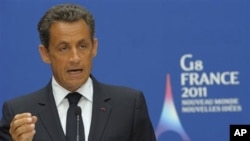With uprisings heating up the Arab world and the world's economy uncertain, there will be plenty for world leaders to discuss at this week’s G8 meeting in France. Differences over how to respond to these global challenges have the potential to cause disagreements among G8 leaders.
A packed agenda awaits world leaders as they make their way to the French seaside town of Deauville for the G8 summit. At the head of the list: the question of how the rest of the world should respond to the uprisings across the Arab world.
NATO is engaged in a bombing campaign against Colonel Moammar Gadhafi’s forces in Libya, and there is concern in some countries that mission creep is taking hold.
Stephanie Rickard is an expert on international relations at the London School of Economics. "There will potentially be some conflict, particularly with Russia. Russia has already made clear that they don’t support what is going on in Libya, they don’t think that intervention is the way to go and so there’s potentially room for disagreement between Russia and some of the other G8 countries. But again that disagreement will probably take place behind closed doors," she said.
The violent suppression of uprisings in Syria and Bahrain will also feature high on the G8 agenda. Analysts say disagreement is likely over how the outside world should deal with the issue.
Visiting Britain ahead of the G8, U.S. Secretary of State Hillary Clinton gave a clear warning to the Syrian leadership. "President Assad faces a choice: he can lead the transition to democracy that the Syrian people have demanded or he can as President Obama said on Thursday get out of the way, but there is no doubt that if he does not begin to lead that process, his regime will face continuing and increasing pressure and isolation," she said.
Pakistan will also face scrutiny at the meeting after the U.S. killing of al-Qaida chief Osama bin Laden earlier this month on Pakistani soil.
In addition, Western leaders have warned that the conflict in Afghanistan is in danger of being overshadowed by the so-called Arab spring.
Another regular topic at recent G8 meetings is Iran’s nuclear program. The European Union has renewed its sanctions against Tehran, accusing it of trying to develop nuclear weapons.
British Foreign Secretary William Hague said pressure on Iran must be maintained. "It is important not to forget, while so many things are happening and changing in the Middle East, that Iran continues with its nuclear program. We have called in the United Kingdom for many months for an intensification of peaceful pressure on Iran," he said.
The fallout from the nuclear crisis at the Fukushima power plant in Japan will also be discussed. G8 host France has called for new international safety standards for nuclear plants.
With Japan slipping back into recession and the debt crisis still haunting Europe, the world economy remains in a fragile state.
On top of that comes the resignation of Dominique Strauss-Kahn as head of the International Monetary Fund, after he was charged with sexual assault in the U.S.
However, says Stephanie Rickard of the London School of Economics, those issues may be further down on the agenda. "It’s important to remember that the G8 in 2009 specifically said that the G20 is now going to be the forum for international economic issues. So the G8 has sort of delegated that to the G20 and now the G8 is focusing squarely on security and geopolitical issues," she said.
As this Normandy resort prepares for the G8 invasion, there will be little time for world leaders to enjoy the seaside surroundings.




